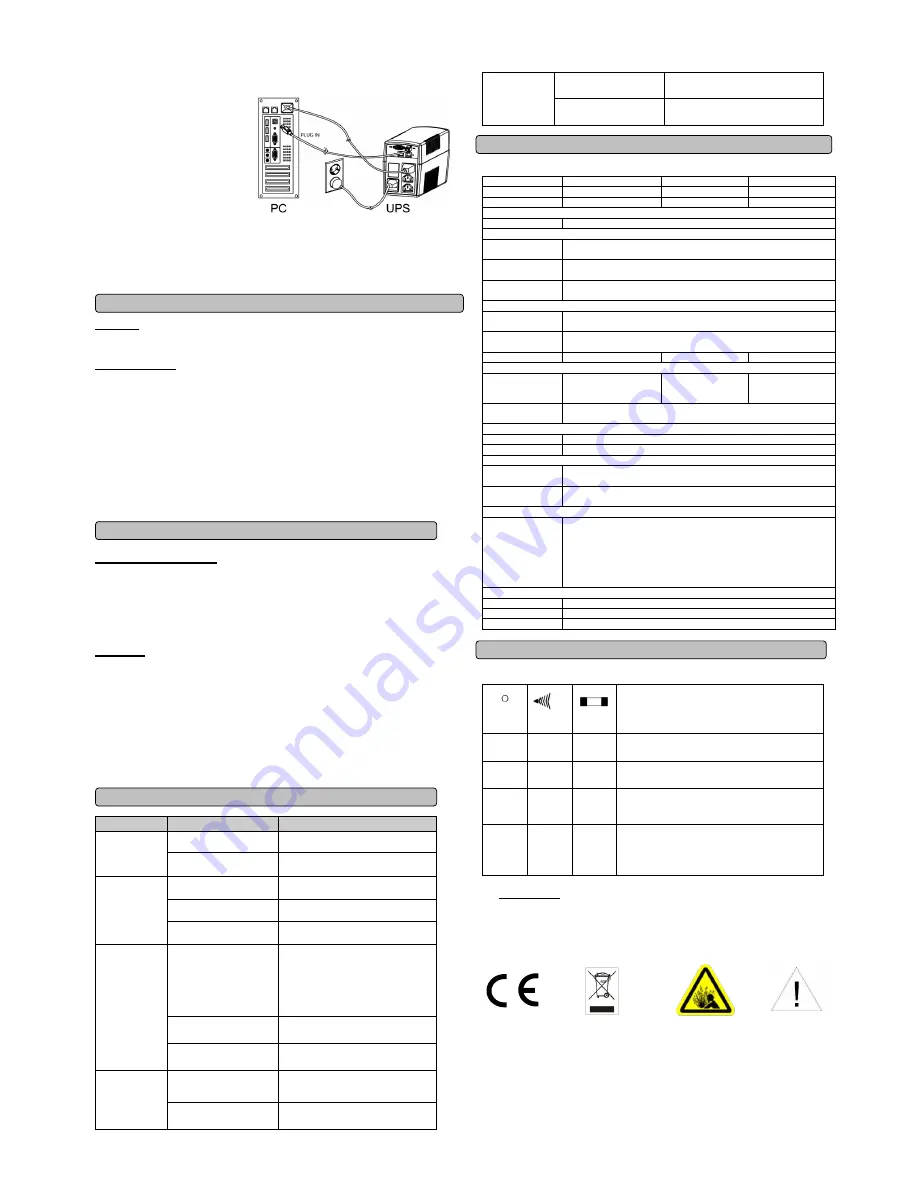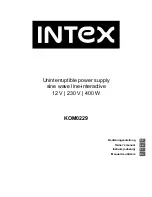
5.
USB Port to PC
This port allows connection and
communication from the USB port
on the computer to the UPS unit. The
UPS communicates its status to the
PowerPanel
®
Personal Edition
software. This interface is also
compatible with the UPS service
provided by
Windows 8/7
/Vista/XP/2000/Server 2003/2008/
2012 ,Mac OSX, Linux.
NOTE:
Only one of these two ports
can be used as communication and
control of the UPS unit at one time.
6.
Communication Protection Ports
Communication protection ports will protect any standard modem, fax, telephone line,
Functional Test
AC Mode
The UPS delivers power to the loads derived from the utility and maintains proper battery charge. It also
regulates the output voltage to within a narrow range.
On-Battery Mode
The UPS operates on battery when the line voltage or frequency has fallen outside the limits. Local
users are alerted to this mode of operation by visual and audible indicators. The UPS provides power to
the load from the battery and through its inverter and the output voltage and frequency of the UPS are
regulated within a narrow range
1.
Switch On
Press the power switch on the front panel then the green LED will light up.
2.
Switch Off
Press again the power switch, the LED on the front panel will go off.
3.
Cold Start / Start on Battery:
This UPS can be turned on even when AC is not present.
Press the power switch on the front panel then the green LED will light up and flashing.
ROUTINE MAINTENANCE AND STORAGE
ROUTINE MAINTENANCE
1.
Use dry soft clothes to clean the front panel and plastic parts. Do not use any detergent that
contains alcoholic ingredient.
2.
The expected lifetime of the battery is around 3 years. Improper operation and harsh environment
will reduce the actual lifetime.
3.
Unplug the UPS from power inlet if the UPS will not operate for long period of time.
STORAGE
1.
First turn off your UPS and disconnect its power cord from the wall outlet. Disconnect all cables
connected the UPS to avoid battery drain.
2.
The UPS should be stored in a cool dry location.
3.
Make sure the battery is fully charged before the UPS is stored.
4.
For extended storage in moderate climates, the battery should be charged for 12 hours every 3
months by plugging the power cord into the wall receptacle and turning on the main switch. Repeat
it every 2 months in high temperature locations.
TROUBLE SHOOTING
Problem
Possible Cause
Solution
The UPS does
not perform
expected
runtime.
Batteries are not fully
charged.
Recharge the battery by leaving the UPS
plugged in.
Battery is slightly worn out.
Contact CyberPower Systems.
The UPS will not
turn on.
The unit is not connected to
an AC outlet.
The unit must be connected to a
220-240V 50/60Hz outlet.
The battery is worn out.
Contact CyberPower Systems.
Mechanical problem.
Contact CyberPower Systems.
Outlets do not
provide power to
equipment
Fuse is blown due to
overload
Turn the UPS off and unplug at least one
piece connected equipment. Unplug the
power cord of the UPS then remove the
fuse compartment beneath the power inlet
of the UPS and replace the blown fuse
with a spare one. Lock the compartment
back to the UPS. Connect power cord
then turn the UPS on. Make sure that your
spare fuse meets the specification.
Batteries are discharged
Allow the unit to recharge for at least 4
hours.
Unit has been damaged by
a surge or spike.
Contact CyberPower Systems.
PowerPanel
®
Personal Edition
is inactive (all
icons are gray).
The serial/USB cable is not
connected.
Connect the serial/USB cable to the UPS
unit and an open serial port on the back
of the computer. You must use the cable
that came with the unit.
The serial/USB cable is
connected to the wrong
port.
Try another serial/USB port of your
computer.
The unit is not providing
battery power.
Shutdown your computer and turn the
UPS off. Wait 10 seconds and turn the
UPS back on. This should reset the unit.
The serial cable is not the
cable that was provided with
the unit.
You must use the cable included with the
unit for the software.
TECHNICAL SPECIFICATIONS
Model
Value600EI
Value800EI
Value1000EI
Capacity (VA)
600VA
800VA
1000VA
Capacity (Watts)
360W
480W
550W
Input
Frequency Range
47~63 Hz (Auto Sensing)
Output
On Battery Output
Voltage
Simulated Sine Wave at /-10%
On Battery Output
Frequency
50/60 Hz
Overload
Protection
On Utility: Fuse; On Battery: Internal Current Limiting
Physical
Total # of UPS
Receptacles
(3) IEC 320 C13
Maximum
Dimensions
32cm(L)*10cm(W)*14cm(H)
Weight
5.5 kg
6.1 kg
6.4 kg
Battery
Sealed
Maintenance Free
Lead Acid Battery
12V/7AH
12V/8.5AH
12V/8.5AH
Typical Recharge
Time
8 Hours
Warning Diagnostics
Indicators
Power On / Using Battery
Audible Alarms
On Battery, Low Battery, Overload
Environmental
Operating
Temperature
+32
F to 95
F ( 0
C to 35
C )
Operating Relative
Humidity
0 to 95% NON-CONDENSING
Communication
1. PowerPanel
®
Personal Edition
Software (for
USB Port)
2. PowerPanel
®
Software (for
Serial Port)
Windows 98/ME/2000/NT/XP/Server 2003/Vista/7
Management
Auto-Charger
Yes
Auto-Restart
Yes
USB
Yes
DEFINITIONS FOR ILLUMINATED LED INDICATORS
LED
Alarm
Fuse
Condition
On
Off
Normal
Normal
Flash
Two
Beeps
Normal
Utility Failure - The UPS is providing battery power to outlets.
Flash
Rapid
Beeps
Normal
Utility Failure - The UPS is providing battery power. The
rapid beeps indicate the battery will run out of power shortly.
Off
Long
Beep
Normal/
Blown
Overload - Occurs when connected equipment exceeds the
rating of the unit. Turn the UPS off and unplug at least one
piece of equipment from the UPS. Check the fuse and do the
replacement if necessary. Turn the UPS on.
Visit www.cpsww.com for more product information
Entire contents copyright © 2013 CyberPower Systems, Inc. All rights reserved. Reproduction
in whole or in part without permission is prohibited.




















